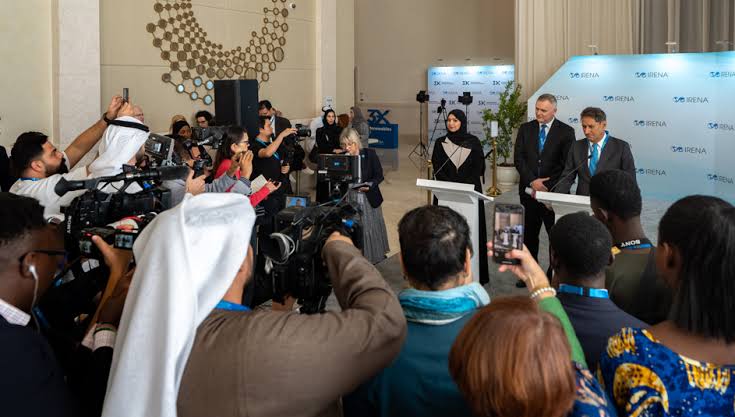The United Arab Emirates (UAE) has once again demonstrated its leadership in global energy transformation by reaffirming its commitment to the energy transition at the 15th Assembly of the International Renewable Energy Agency (IRENA) held in Abu Dhabi. The UAE, a nation historically known for its oil reserves, has increasingly positioned itself as a pivotal player in the global movement toward sustainable and renewable energy solutions. At the heart of its strategy lies the ambition to lead in clean energy innovation, diversify energy sources, and reduce its carbon footprint.
Commitment to Sustainability and Clean Energy
The 15th IRENA Assembly, which brought together global leaders, policy makers, and energy experts, underscored the UAE’s vision for a sustainable energy future. In his address at the Assembly, UAE’s Minister of Energy and Infrastructure, Suhail Al Mazrouei, emphasized the nation’s firm commitment to transitioning to a low-carbon economy while ensuring energy security for the region and the world. The UAE has been making significant strides in energy diversification, with renewable energy investments, technological advancements in clean energy, and carbon capture projects all aimed at ensuring a greener future for the planet.

Al Mazrouei highlighted the UAE’s ambition to achieve net-zero emissions by 2050, a goal that was set in line with the UAE Energy Strategy 2050. This strategy outlines a roadmap to enhance the energy mix by integrating renewable energy sources like solar and wind while reducing reliance on fossil fuels. The UAE is already home to some of the world’s largest solar energy projects, including the Noor Abu Dhabi solar plant, which stands as a testament to the country’s dedication to pioneering energy solutions.
The UAE’s commitment to sustainability has not only been reflected in its national policies but also in its active participation in global climate agreements, such as the Paris Agreement. As the world turns its focus toward achieving net-zero emissions, the UAE has consistently positioned itself as a key player in driving international energy dialogue, with an emphasis on innovation, collaboration, and investment in renewable energy technologies.

The Role of IRENA in Accelerating UAE Energy Transition
The International Renewable Energy Agency (IRENA), founded in 2011, plays a critical role in promoting the adoption and sustainable use of renewable energy worldwide. The agency works with governments and the private sector to enhance renewable energy policies, advance technological innovation, and facilitate investment in renewable energy projects. As a host country for the 15th IRENA Assembly, the UAE has once again proven its commitment to accelerating the global transition to renewable energy.
During the assembly, IRENA’s Director-General, Francesco La Camera, commended the UAE’s leadership in the renewable energy sector. He emphasized that the UAE’s energy policies serve as a model for other nations looking to strike a balance between economic development, energy security, and environmental sustainability. La Camera also acknowledged the UAE’s significant investments in clean energy, including the establishment of the Mohammed bin Rashid Al Maktoum Solar Park, a large-scale renewable energy project that is poised to be a cornerstone of the UAE’s renewable energy future.
IRENA’s role in global energy transition is more critical than ever, especially as countries around the world grapple with the urgent need to combat climate change. The assembly discussed several key initiatives, such as the need to diversify the renewable energy mix, enhance energy storage technologies, and provide financial support to developing nations in their efforts to adopt clean energy solutions. For the UAE, IRENA serves as a strategic partner in achieving its energy goals, ensuring that the country remains at the forefront of global renewable energy developments.
UAE’s Investments in Renewable Energy Innovation
In recent years, the UAE has invested heavily in renewable energy innovation, positioning itself as a leader in the clean energy sector. Through entities like the Abu Dhabi Future Energy Company (Masdar), the UAE has expanded its renewable energy portfolio, focusing on solar, wind, and hydroelectric power generation. Masdar has been a significant player in the development of global renewable energy projects, including solar and wind farms in countries such as the United Kingdom, Mauritania, and Egypt.
The UAE’s commitment to energy innovation is further exemplified by its role in supporting the development of emerging technologies such as green hydrogen, carbon capture and storage, and energy storage solutions. These technologies are critical for reducing carbon emissions and increasing energy efficiency, particularly in industries that are difficult to decarbonize, such as heavy industry and transportation.
In 2020, the UAE launched the world’s first green hydrogen plant in Masdar City, a project aimed at creating a sustainable hydrogen economy in the region. This milestone underscores the UAE’s vision of harnessing hydrogen as a clean energy source for both domestic and international markets. The UAE’s investments in such projects highlight its long-term commitment to sustainability and its position as a leader in driving technological innovation in the renewable energy sector.
The UAE’s Vision for a Carbon-Free Future
As the UAE looks to the future, its Vision 2050 plan stands as a testament to the country’s resolve in achieving a carbon-free future. The plan’s centerpiece is the transition to renewable energy, with an emphasis on solar, nuclear, and wind power. In addition to reducing emissions, the Vision 2050 plan seeks to enhance the country’s energy security by diversifying its energy sources.
The UAE’s ambitious sustainability goals include increasing the share of clean energy in the national energy mix to 50% by 2050, reducing carbon emissions by 70%, and improving energy efficiency by 40%. These targets align with the broader global objectives of combating climate change and limiting global temperature rise. The UAE is not only striving to meet its own energy needs but is also taking steps to contribute to the global energy transition.
The establishment of the UAE’s Energy Strategy 2050 has further solidified the country’s commitment to reducing its carbon footprint. By focusing on energy efficiency, renewable energy, and carbon capture technologies, the UAE aims to set a global example of how countries can transition to a sustainable energy future without compromising economic growth.
Conclusion: Leading the Charge for Global Energy Transition
The UAE’s reaffirmation of its commitment to the global energy transition at the 15th IRENA Assembly highlights the nation’s proactive stance in shaping a sustainable energy future. By aligning its national policies with global climate goals, making significant investments in renewable energy, and driving innovation in clean energy technologies, the UAE has positioned itself as a global leader in the fight against climate change.
As the world continues to face the challenges of climate change and the transition to a low-carbon economy, the UAE’s leadership in renewable energy offers a model of success that other nations can look to. With continued investment in renewable energy, technological innovation, and international collaboration, the UAE is well on its way to achieving its ambitious energy goals, contributing to the global effort to create a more sustainable and energy-secure future.
Do follow Uae stories for more Updates
UAE’s first Creators HQ opens, aims to attract 10000 influencers in next period













